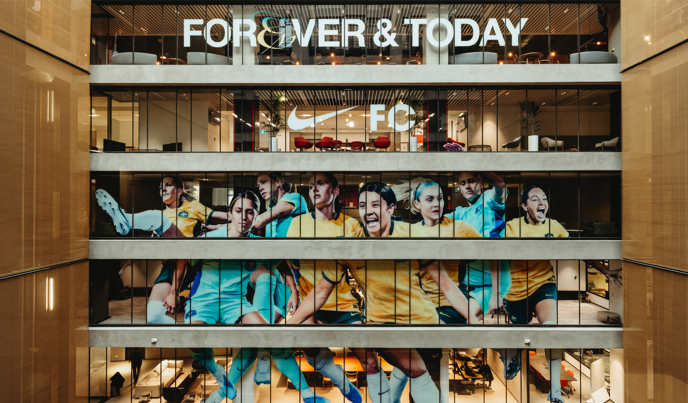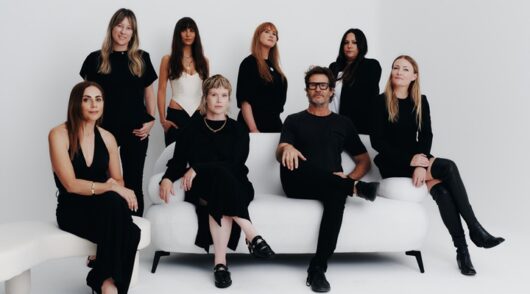Retail has long capitalised on social and cultural events in order to generate sales. This can be seen in the countless marketing campaigns that were launched in the leadup to the Barbie movie, which stimulated huge activity for hundreds of brands. Sporting events have also proven to be invaluable for brands as a means of aligning themselves with and engaging the public. Retailers of all sizes have established partnerships with clubs and associations to tap into specific target audiences that sh
share these affiliations.
Earlier this year, Westfield became an official partner of Netball Australia – with its multi-tier sponsorship covering all levels of the game. Scentre Group’s head of destinations Elena Petroska said that it was part of the shopping centre’s focus to attract more people to its Westfield destinations.
“Sport is such an important part of our customers’ lives and is something that brings us all together. On the weekends and around major sporting events our centres are buzzing, with many of our customers visiting for lunch or dinner before or after a match to purchase team merchandise from our business partners, or take advantage of the public transport hubs available in or near our centres,” Petroska told Inside Retail.
“Tens of thousands of Australians play grassroots netball, so it’s fantastic to be able to connect with fans and players both at games and through in-centre activations and bespoke retail offers.”
At the moment, the Fifa Women’s World Cup is capturing the imagination of people around the world – in particular, in its host countries, Australia and New Zealand.
Australia’s national women’s football team, the Matildas, broke TV ratings records in its recent match against Denmark, drawing a metro audience of 2.294 million viewers, according to rating agency Oztam.
Prime Minister Anthony Albanese has already advocated for a public holiday if the Matildas win the World Cup. However, there has been pushback on this proposal from industry bodies, due to the potential cost of this initiative.
Meanwhile, the state of Victoria recently cancelled host duties for the Commonwealth Games – which were scheduled to take place in regional areas in 2026 – citing economic concerns. This highlights some of the challenges that investing in sporting facilities and events can present for retail and other industries.
So, how can retailers make the most of large sporting events, and are public holidays an effective tool to generate more activity?
Visitation strategies
According to Paul Zahra, CEO of the Australian Retailers Association, international sporting events can be an important part of the visitation strategies used by retail and hospitality businesses to drive increased traffic and expenditure.
This has been demonstrated during the Fifa Women’s World Cup, with brands including Nike and Adidas leveraging the enthusiasm around both the tournament, and the Matildas, in order to drive merchandise sales, and boost brand recognition and activity.
He also told Inside Retail that extended stays from visitors and tourists can lead to flow-on benefits, and inspire investment in other categories – such as hospitality spending, TV upgrades and other purchases to enhance the at-home experience.
“Beyond this, there is the brand halo that Australia and Australian cities receive when we host an event such as the Fifa Women’s World Cup. [The] media coverage associated with this event can often put Australia more firmly on the map as a future travel destination,” Zahra said.
Sporting events can also lead to greater consumer spending, with the success of local sporting teams acting as a mood enhancer. According to 2010 World Bank data, total household expenditure by emerging economies on sport amounted to over $38 billion.
Business casualties
Given the benefits for businesses that can come from major sporting events, the Victorian government’s decision to withdraw hosting duties for the 2026 Commonwealth Games will likely have flow-on effects for Australian retailers.
These types of events can play a powerful role in revitalising cities and tourist spots post-pandemic, both during and beyond the event, and are particularly important for regional areas, where retailers face various challenges related to visibility and access.
“We often see infrastructure investments and urban improvements as well as an increase in investments in businesses taking place around these sorts of events, which provide less direct but important flow-on benefits to retail and hospitality,” Zahra said.
However, events such as the Commonwealth Games can be hugely costly, with evidence that the costs don’t justify the benefits associated with the investment. For instance, according to research from the University of Oxford, in real terms, the average cost overrun for all Olympic Games is 156 per cent.
“Major events can also play a disruptive role for retail,” Zahra said. “The building and planning of infrastructure projects whilst of great and lasting benefit in the longer term can also disrupt regular business activity in the build-up, and create some business casualties.”
“In the wake of the Commonwealth Games decision we would be keen to see a focus on other options that will create buzz and attract visitors.”
Public holidays: impediment or opportunity?
Zahra also expressed concerns about an additional public holiday being instituted around the World Cup.
Scheduled public holidays and retail events can be effective in stimulating retail activity – with last year’s Christmas and Boxing Day, generating strong year-on-year sales growth. Public holidays can also boost tourism which, in turn, can benefit retailers across different categories.
However, holidays can also be costly. According to economist Stephen Koukoulas, a one-off public holiday marking the death of Queen Elizabeth last year likely cost the Australian economy $1.5 billion in lost productivity.
The debate around the benefits and pitfalls of public holidays for retailers came to a head in 2015, when Victoria introduced a new public holiday, creating a long weekend to celebrate the AFL grand final. According to Australian Industry Group research at the time, surveyed businesses who weren’t opening on the new public holiday anticipated losing $15,800 in income.
A follow-up analysis of spending data in 2018 showed that while spending slowed over the long weekend, it was significantly up the day before the long weekend.
“Whilst Aussies love a public holiday, we do already have a high number of these across the year and adding more could create more of an impediment than an opportunity for business,” Zahra said.
“Public holidays are costly to manage and operate due to increased pay rates, the lack of availability of staff and a bit of a hit and miss opportunity around retail and hospitality traffic.
“National alignment of public holidays is also important – as it can be costly to run business operations when teams are operating on different operating schedules.”
However, if a public holiday were to be created around the World Cup, Zahra suggested that retailers offer pre-promotions, marketing of special aligned offers and customer loyalty offers.
“Making it clear that your store or hospitality outlet is open and on what conditions is also important not only to drive traffic but to allow for planning and to manage customer expectations,” he said.
“Making sure all your channels of communication are updated well in advance around your operating hours is [also] vital.”
Tips to make the most of the moment
According to Zahra, marketing and collaborations around sporting events and other major cultural moments are vital to generate activity – depending on how they’re executed. In planning for this, retailers should generate a keen understanding of the enthusiasm and interest of the sport or club at hand.
“[Make] sure that your business is in touch with the official organisers of that event to really benefit from early information and insights around that fan base and key activities,” Zahra said.
“In many instances, exploring a merchandise licence can be beneficial, but the best opportunities there will go to those who start planning for that well in advance.”







